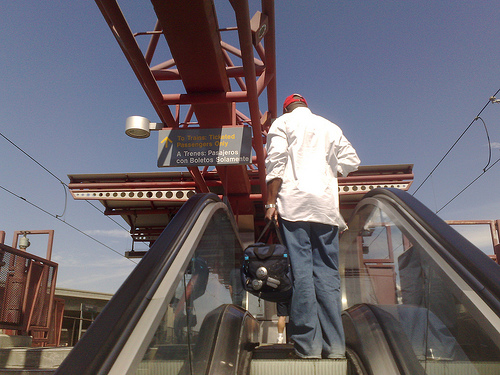Should federal transport spending take job creation into account?
Even as the amount of federal funding awarded to contractors falls, there’s broad recognition that the country must invest in its transportation infrastructure. Earlier this week the Council on Foreign Relations released Transportation Infrastructure: Moving America, its report on America’s aging transportation network, while policy wonks such as former U.S. Treasury Secretary Larry Summers and former governor of Indiana Mitch Daniels regularly raise the alarm on the issue.

Commuters in the Crenshaw/LAX corridor will benefit from the shift in how Federal transportation dollars are spent. From allaboutgeorge.
“It’s an enduring irony that the U.S., allegedly the home of innovation, is absolutely block-headed and backwards in this one respect,” Daniels told Bloomberg Businessweek earlier this month.
But while Daniels and leading think tanks continue to push for infrastructure investment, Jobs to Move America has been working to influence procurement policies to ensure that public monies used to fund transportation projects are reinvested in local communities in the form of jobs.
In July, the coalition, which includes more than thirty organizations addressing community, faith, environmental, labor, civil rights, academic, and philanthropic issues, announced its U.S. Employment Plan, which provides policy guidelines around procurement. Public agencies that award multimillion-dollar contracts for transportation projects are encouraged to incorporate the coalition’s policy tools in their requests for proposals, the bidding process by which such projects are awarded.
For instance, organizations might ask bidders to list the number and quality of jobs they’ll provide if awarded the contract. Agencies could also contractually obligate bidders to implement their jobs plans, thus committing companies to work with local groups.
The coalition’s recommendations are already being implemented. In California, L.A. Metro approved a labor-trade agreement and construction careers policy that requires businesses awarded contracts with the agency to source 40% of jobs from areas of high unemployment. The initiative also hopes to award 10% of jobs to disadvantaged workers, such as veterans or people on public assistance.
The mandate is seeing its first test with the Crenshaw/LAX Transit Corridor project, an 8.5-mile light-rail line that will run through or near impoverished neighborhoods in south L.A. Walsh/Shea Corridor Constructors — the company awarded a $1.27 billion contract for construction of the line — has said it will draw 3,000 of the 7,500 workers needed for the project from low-income areas.
While some are skeptical of the effort’s success, others believe it heralds a real change in the way government approaches procurement. Traditionally, price has been the overriding criterion determining decisions about government contracts. The plan pushed by Jobs to Move America promotes the idea that other criteria— job creation, job training opportunities, economic stimulus —deserve equal attention.
“Jobs shouldn’t be an afterthought when you’re spending billions of public dollars,” Jorge Ramirez, president of the Chicago Federation of Labor and a member of Jobs to Move America, told the press.
If the coalition’s recommendations gain traction, advocates believe it will signal a sea change in procurement policies, but the bigger hurdle may be finding the political will and funding to support public investment in transportation infrastructure improvements.
[Correction: Rachele from Jobs to Move America wrote in to let us know the following: “…There are two separate policies that LA Metro has used, mixed together. 1 is the “U.S. Employment Plan” policy created by the Jobs to Move America coalition to spur good jobs created on transit manufacturing contracts; and 2 is the “Construction Careers” policy and Project Labor Agreement created by the Los Angeles Alliance for a New Economy (LAANE), that set targeted hire requirements for transit construction contracts. They both have the same philosophy — making public transit dollars go further, for good jobs in our community.” So procurement and manufacturing play a part in Jobs to Move America’s plans, too.]
Related Posts
Category: Legislation, Transportation

















